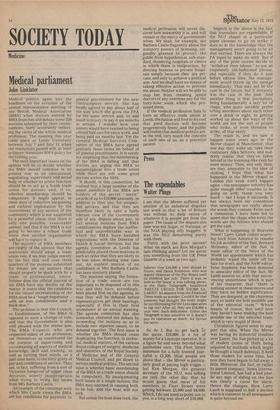SOCIETY TODAY
Medicine
Medical parliament
John Linklater
Medical politics again hits the headlines on the occasion of the annual representative meeting of the British Medical Association (BMA) when doctors elected by BMA branches will debate some 350 motions submitted by their constituencies, fairly accurately reflecting the views of the whole medical profession. The meeting this year takes place at Leeds University between July 7 and July 11 when the resolutions passed will, at least in theory, formulate BMA policy for the coming year.
The most important issues on the agenda will be to decide whether the BMA should continue in its present role as an educational, negotiating, supervisory and social body or Whether its prime function should be to act as a frank trade union for doctors and, if so, whether membership should be compulsory. It might appear, in these days of collective bargaining and ruthless exploitation by the Government of any section of the community which is not supported by a powerful union, that there is only one possible, reasonable answer, and that if the BMA is not going to become a robust trade union then another organisation will have to replace it.
The majority of BMA members are deafly of the opinion that the association should adopt a trade union role, if we may judge merely by the fact that well over three quarters of the motions submitted for debate are on matters that should properly be dealt with by a trade, or professional, union. Neither does the official journal of the BMA have any doubts on the matter. It states that the candidate for the vacant secretaryship of the BMA must be a "tough negotiator . . with an iron constitution and a thick skin."
The problem is that the Council, or Establishment, of the BMA is opposed to such a change of role, and that the Government is also well pleased with the status quo. The BMA Council, who are respected elders of the profession, see themselves as constituted for the purpose of supervising and co-ordinating all aspects of medical knowledge, skill and training, as well as turning their minds, on a part-time basis, to the nitty gritty of pay and conditions of service. They are, in fact, suffering from a sort of Victorian hangover of upper class decorum, utterly inappropriate when trying to wring fair terms from Mrs Barbara Castle. • An example of the contempt with which Mrs Castle views the BMA are her conditions for payment to general practitioners for the new contraceptive service. She has finally agreed to pay about half of the sum which she gives the FPA for the same service and, to add insult to injury, to pay it six months in arrears. I wonder how coal miners would have reacted to being offered half rate for extra work, and being paid six months late. Yet the General Medical Services Committee of the BMA have agreed precisely these terms on behalf of all general practitioners. It is surely not surprising that the membership of the BMA is falling and that doctors are urging the BMA to metamorphose into a trade union while there are still some good doctors within the NHS.
It should, in this connection, be realised that a large number of the senior members of the BMA are holders of the secret "merit" awards of up to £10,000 annually, in addition to their pay, for unspecified services, and that they are therefore likely to take a fairly tolerant view of the Government side of any dispute about pay. In fact several motions from BMA constituencies deplore the ineffectual and unpredictable way in which the BMA have handled negotiations with the Director of Health & Social Services, but the agenda committee at Leeds has predictably placed these motions in such an order that they are likely to be lost when debating time runs out. An explicit motion of no confidence in Mrs Barbara Castle, has been similarly placed.
The motions urging the formation of a trade union are too important to be disposed of in this way and they have, accordingly, been placed first on the agenda, so that they will be debated before representatives get their bearings, especially if this is their first attendance at an annual meeting. The agenda committee has also somewhat obscured the debate by re-wording the motions so as to include two separate issues, to be debated together. The first issue is whether the BMA should cease duplicating the function, in technical, medical matters, of the various Royal colleges of surgery, medicine and obstetrics, of the Royal Society of Medicine and of the General Medical Council, and get down to serious medical politics. The second issue is whether basic membership of the BMA as a trade union should be compulsory. By amalgamating both issues in a single motion, the BMA may succeed in causing both to be lost, and the boat will not rock.
But unless the boat does rock, the medical profession will never discover how seaworthy it is, and will remain at the mercy of government whim. We shall, for example, see Barbara Castle flagrantly abuse the statutory powers of licensing, originally granted to protect the public from hypothetical, sub-standard, shoestring hospitals or clinics in which there is malpractice, by denying licences to private hospitals simply because they are private, and only to achieve a political aim. And we shall have no means of taking effective action to prevent the abuse. Neither will we be able to stop her from cheating junior doctors of any overtime pay for the forty-hour week. which she promised them,
If the medical profession fails to form an effective trade union at Leeds, the nation will find to its cost that good doctors will become progressively fewer, and the public will realise that medical politics are, in the end, very much the concern of each one of us, as a potential patient.


































 Previous page
Previous page